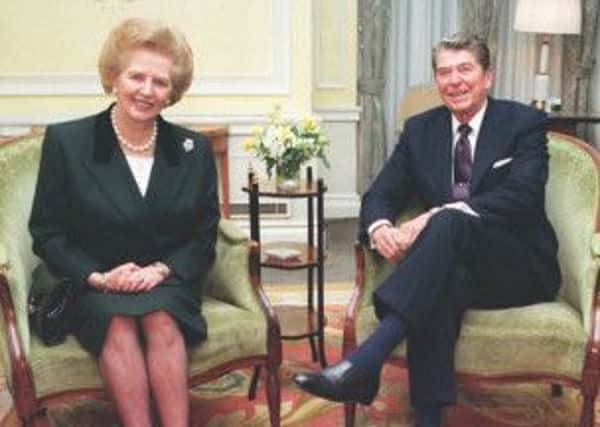Ted Bromund: Thatcher’s radical spirit bridged the Atlantic to drive a revival of the West


Many leaders – even many US allies – feel free to bash US policy, or to sneer down their noses at Americans. Undoubtedly that wins them easy popularity at home and abroad, but Americans do notice it, and they resent it. Thatcher appealed to our higher instincts – for leadership and for liberty – and she did it not as a nag or a scold, but with a dignity that paralleled Ronald Reagan’s finest speeches.
Of course it is her partnership with Reagan that is foremost in the minds of American conservatives now, and rightly so. Today, the fashion is to point out where she and Reagan disagreed. It is a disservice to Thatcher’s intelligence and patriotism to deny that those disagreements existed. But great partnerships rise above differences, just as Roosevelt and Churchill rose above theirs in an earlier generation.
Advertisement
Hide AdAdvertisement
Hide AdThatcher was fortunate in many ways. She was shaped by the shattering experience of the failure of the Heath government and the dismal 1970s, when she was of the right age to seize the helm of the Conservative Party from Edward Heath. She was lucky that North Sea oil came on stream as she moved into Number Ten. She was lucky that the papacy fell to John Paul II, in Reagan’s election, and in the staunchness of other Western leaders of the era, especially Helmut Kohl of Germany.
Democracy sometimes suffers by comparison with dictatorship because it seems to lack dynamism, but compared to Soviet fossils like Chernenko and fascist Argentine dictators like Galtieri, the West in the 1980s was obviously the more energetic side.
If much of Thatcher’s reputation in the US stems from her liking for America, she also benefits from being one of the great leaders who oversaw the West’s revival and the fall of the Soviet Empire.
She was equally lucky in her enemies, from the unlikeable Heath, to the hilariously out of date Michael Foot, to the egregious Arthur Scargill, to the perpetual bridesmaid Neil Kinnock. The gap in political talent – and in many cases intelligence – between Thatcher and her contenders at home was almost as embarrassing as the gap between the West and its adversaries. Americans noticed that too.
Advertisement
Hide AdAdvertisement
Hide AdBut of course, luck is what you make of it, and, like Reagan, Thatcher made the most of her luck. There were missed opportunities: Conservatives have never quite figured out what they want to make of local government, a failure that haunts the Cameron government today. But much of Thatcher’s legacy has endured. No future British government is going to nationalise large chunks of the economy.
Thatcher’s legacy is weakest in areas of policy-making that barely existed when she was in office. In the 1980s, the entitlement systems of the West were still adding workers, not paying for retiring ones. The European Union was still mostly a wasteful system of agricultural subsidies, not a nascent federal state. She saw those dangers coming, but they were left for her successors to confront
By and large, they failed to do so. What is remarkable about her successors is how poorly they seized their chances. Tony Blair wasted a majority as big as Thatcher’s at her peak by failing to make Britain’s social services financially sustainable. That failure should be far more controversial than anything Thatcher did, because – as in the US – it is a failure that we will be a long time in paying for.
Americans are generally unconcerned with the controversies that attended Thatcher’s time in office. It makes no difference here how large a subsidy Scargill demanded. It is strange that those controversies are still alive in Britain. In the US, Harry Truman, reviled when he left office by Republicans, has now become a bipartisan hero. So has Reagan, whose mantle Democrats are eager to claim.
Advertisement
Hide AdAdvertisement
Hide AdThat transition to being an all-party hero has not yet come in Britain. Of course, Churchill remained controversial for many years, so here too Thatcher is in good company. But the reason reflects on the final reason that Americans like Thatcher. A thoroughly British patriot, Thatcher appeals to Americans because she relished taking decisions with an American-style snap.
The British system since the 1920s had become deeply consensual, to the point where in the 1970s it seemed impossible to achieve anything. Thatcher broke through that in the only way possible. Regrettably, the smothering waters of consensus returned, as they are wont to do in all democracies.
Indeed, if we in America would benefit from just one part of her legacy today, it would be her radical conservatism, her willingness to challenge vested interests. It exemplifies the value of what America, long the world’s most opportunity-friendly society, is on the brink of losing. As we remember Margaret Thatcher, Americans are remembering what their country should be. And, she would add, still can be.